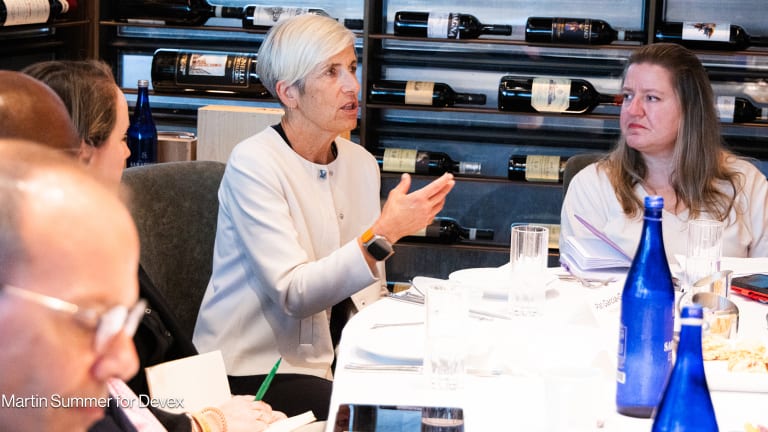
Over the past 22 months, health systems around the world have been under immense strain as countries have confronted the deadliest pandemic of the last 100 years and embarked on an unprecedented global vaccination effort. COVID-19’s pressures have shed light on systemic weaknesses and worsened equity gaps, particularly in low-income countries, which for too long have received little investment to build resilience.
Those who have been hit hardest are low-income communities and the most vulnerable people. They have the fewest resources to build their resilience ahead of time or to respond to the crisis. That is why equity must be at the heart of the continued pandemic response, with the most vulnerable and marginalized able to have access to the services they need.
Among the pandemic’s devastating ripple effects is the disruption of up to 25% of essential health services, igniting a secondary health crisis — particularly for women, children, and adolescents. Unfortunately, women and children are dying from health issues that are entirely preventable or easily treatable. They are unable to access hydration when sick, routine vaccinations, or care during childbirth.
Report: Dozens of nations might struggle to fund health after COVID-19
The World Bank warns that 52 nations will see overall government spending fall below pre-pandemic levels, impacting their ability to finance COVID-19 vaccines and health systems more broadly.
Supply-chain disruptions have reduced access to vital tools and medicines, financial barriers to health care have been exacerbated by job losses, and an additional 100 million people are said to be on the brink of extreme poverty. With many resources diverted to contend with COVID-19, fragile and limited resources have been stretched thin.
With that in mind, the World Bank has deployed over $157 billion — the largest crisis response in its history — to save lives, protect the poor and vulnerable, achieve sustainable growth, and rebuild in better ways. This includes over $50 billion of International Development Association resources, our fund for the most vulnerable, which provides grants and highly concessional terms.
The Global Financing Facility — a partnership that provides finance and technical assistance to countries to scale up access to affordable care for women, children, and adolescents in coordination with World Bank health projects — is doubling down on efforts to ensure that essential health services are prioritized and health systems are strengthened as part of countries’ COVID-19 response.
Transforming health financing is key to building back better
The health crisis resulting from the pandemic is eroding years of gains in maternal and child health. As the pandemic rages on, the need to secure more financing to strengthen essential health services and respond to future emergencies is now more urgent than ever.
To maintain pre-COVID-19 trends on health spending, governments will have to increase the share of their resources for health. Yet, the latest projections from the World Bank suggest that the majority of low- and lower-middle-income countries will be unable to raise the public funds necessary to finance the country’s share of COVID-19 vaccine rollout, invest in pandemic preparedness, and make progress toward universal health coverage.
LMICs will have to make tough choices in health investment to safeguard essential health services. Working with partners, the World Bank and GFF can support governments to maximize outcomes of their investments, ensuring they are directed toward the highest impact, or most-needed interventions.
For example, in Rwanda, GFF and World Bank have co-financed support to the government to address COVID-19’s impact on families working in the informal sector. This support is helping families — whose earnings don’t allow for enrollment in the public social safety nets but are still struggling to cover their essential needs — to access emergency cash assistance.
Coordinated efforts can also help to align resources and focus across partners to reduce backlogs in the system, all while rolling out the tools needed to bring the pandemic under control.
In Mozambique, GFF in tandem with the World Bank is supporting distribution of essential health drugs and COVID-19 tools to rural areas as well as training health workers in the COVID-19 vaccine campaign, while promoting demand and access to essential health services.
Primary care front and center
Strong and integrated primary and community-level care must also be at the center of the response and recovery. After all, the health systems that are needed for both are the same. Only by doing this can countries reclaim the gains made in areas such as sexual and reproductive health and build back better to meet the evolving needs of the population.
Before COVID-19 hit, key interventions for reducing maternal and newborn deaths — such as the use of skilled birth attendants, facility-based births, and postnatal and antenatal care — were improving across the majority of GFF partner countries.
With the resources being raised for IDA20 and an additional $1.2 billion funding for GFF, the World Bank and GFF can support countries to reclaim the gains made on health before the pandemic and strengthen primary health systems, making them more resilient and responsive to global health threats and population needs.
With countries’ cooperation, I am confident that we can end the pandemic and get progress back on track. Only by recognizing this joint interest and backing it with adequate resources can LMICs help to build a healthier, more secure, and prosperous future.








